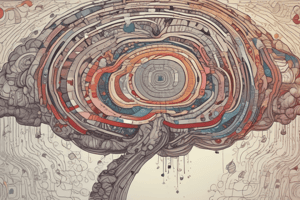Podcast
Questions and Answers
What model of working memory was proposed by Baddeley and Hitch in 1974?
What model of working memory was proposed by Baddeley and Hitch in 1974?
A model of working memory that comprises the Phonological Loop, Visuo-Spatial Sketchpad, and Central Executive.
What is the primary function of the Phonological Loop in Baddeley and Hitch's model of working memory?
What is the primary function of the Phonological Loop in Baddeley and Hitch's model of working memory?
To keep track of words and sounds.
What is the role of the Visuo-Spatial Sketchpad in Baddeley and Hitch's model of working memory?
What is the role of the Visuo-Spatial Sketchpad in Baddeley and Hitch's model of working memory?
To remember and manipulate images and locations.
What is the primary function of the Central Executive in Baddeley and Hitch's model of working memory?
What is the primary function of the Central Executive in Baddeley and Hitch's model of working memory?
What brain region is thought to be involved in the Central Executive component of working memory?
What brain region is thought to be involved in the Central Executive component of working memory?
What is the process by which information is transferred from short-term memory to long-term memory?
What is the process by which information is transferred from short-term memory to long-term memory?
What is the process of turning perceived information into a form that can be stored in memory?
What is the process of turning perceived information into a form that can be stored in memory?
What factor helps to make encoding more effective?
What factor helps to make encoding more effective?
What is an example of incidental learning, and how does it relate to levels of processing?
What is an example of incidental learning, and how does it relate to levels of processing?
What is the main difference between short-term memory and long-term memory?
What is the main difference between short-term memory and long-term memory?
Flashcards are hidden until you start studying
Study Notes
Characteristics of Short-Term Memory (STM) and Long-Term Memory (LTM)
- STM can hold only a few items (5-9) and information is quickly forgotten unless repeated or rehearsed
- LTM can hold a vast amount of information, is limitless, and forgets slowly
Brain Activity
- Increases when using STM, but only for a short time
- Involves lasting changes in brain connections when learning new information
Active Nodes of LTM
- Certain information from LTM is currently being used and is active in STM
Memory Theories: Record-Keeping vs. Constructionism
- Record-keeping theory is flawed as it suggests memory is a perfect copy, which is not the case
- Constructionism theory suggests memory is actively constructed and can be distorted
Record-Keeping Theory Criticisms
- Memory is not a perfect copy of what happens
- Memory can be distorted, and new information can change or alter memories
- Forgetting is not just losing information, but rather, information may be inaccessible at the moment
The Overlap Principle (Encoding Specificity)
- Remembering information better when the conditions of recall are similar to the conditions of learning
- Environmental cues, mental and emotional state, and associations can trigger memories
Storage, Rehearsal, and Elaboration
- Storage: keeping information over time so it doesn't get lost
- Rehearsal: going over information to help remember it
- Elaboration: adding more details to make the memory stronger
Retrieval
- The process of finding and bringing back stored information into active thinking or consciousness
Distinctions between STM and LTM
- STM holds information currently being thought about, is quick, and information is lost quickly
- LTM holds stored information, takes longer to remember, and is more permanent
Baddeley and Hitch's 1974 Model of Working Memory
- Phonological Loop: mental notepad for keeping track of words and sounds
- Visuo-Spatial Sketchpad: helps remember and manipulate images and locations
- Central Executive: manages attention, organizes tasks, and keeps track of goals
Long-Term Memory and Memory Processes
- Information repeatedly rehearsed in STM can be transferred to LTM
- Encoding: process of turning perceived information into a form that can be stored in memory
- Levels of processing: the deeper you think about something, the better you will remember it
Studying That Suits You
Use AI to generate personalized quizzes and flashcards to suit your learning preferences.




